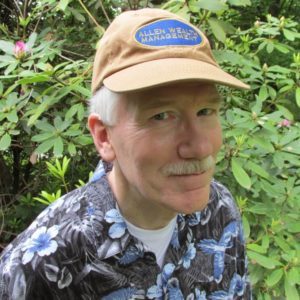Well, the first part of my title isn’t entirely true. Before I retired from teaching in 2015, I read and annotated more than I care to count.
And I wrote perhaps a dozen scholarly articles. Quite a few book reviews. An occasional memorial tribute for a friend. And one disgruntled diatribe about my wife’s effort to transmute both public apathy and a ruined South Carolina swampland into a public park. (Yes, Barbara succeeded—at the cost of putting the rest of her life on hold for two years.)
But otherwise, it’s been all poetry and prose fiction for me. A curious thing, since my principal mentor, James McConkey, was one of America’s most compelling personal essayists. He began his masterpiece, ultimately called The Complete Court of Memory, in 1960, in the middle of the Cold War, and he added to it for the rest of his writing career. If you haven’t read it, I encourage you to seek it out. You won’t be disappointed. Here’s the foreword to the final iteration, written in 2013:
Gladys Jean—my Jean—died at our home, the Greek revival farmhouse at the crossroads we bought more than 50 years ago. She died of leukemia, at the age of 89, and on March 3 was buried in Greensprings Natural Cemetery Preserve, about 15 miles from our house. Greensprings is on unusually high ground, and provides lovely vistas of hills, forests, and valleys. It is often windy there, and in winter covered with snow. In the other seasons, as grass rises and then ripens on the meadows, Greensprings becomes a habitat for birds. Statuary, mausoleums, headstones—construction of any kind is not permitted.
Natural habitats are as simple as possible, and are intended to avoid environmental harm. Jean’s body, wrapped in a shroud, was carried on a plank through the snow on a path of pine boughs to the gravesite. A blue canopy covered the open grave and the space for spectators to stand. A cushioned folding chair was reserved for me, Jean’s 91-year-old survivor. The service, at my request, was limited to family members. There were our three sons, both of our two daughters-in-law; Jean’s nephew, Dale, who lives with us; one of her nieces with her husband; and a grand niece. (From long custom, I use “we” and “our” as if Jean were still alive: It’s a habit I don’t mind holding onto.)
Two thick boards had been placed over the narrow part of the grave. The four pallbearers—Dale and our three sons, Larry, Cris, and my namesake Jim—lowered the plank containing the shrouded body to those boards, where it remained throughout the brief service led by the coordinator for spiritual care for Hospicare. After several minutes for silent meditation, she asked us to share with each other our reflections, to say whatever was on our minds.
We were bundled up against the cold; we were surrounded by snow. We were gathered around a body that, encased in its white shroud, was shaped like a carrot. A description like that sounds bleak, but that is almost the reverse of the setting’s effect on me. First of all, the shrouded figure was not Jean: her consciousness—her mind, her memory—had vanished, fled. Her body would soon be returning to the natural world from which it had come, and that would be true of mine and the bodies of us all. I felt an intimacy with the others at the gravesite that went beyond family. And of course, it came from the knowledge that all of us—all living creatures—are mortal.
I listened while the other family members spoke about their memories of Jean. Though I’d decided not to say anything because I didn’t want to break down the way survivors often do at funerals, I was surprised to find myself speaking of something that had never occurred to me over the decades that I’d been writing the autobiographical narratives that constitute Court of Memory—hadn’t realized, really, until I heard my own voice now acknowledging this new awareness: Jean is so crucial to this major work of my writing career that I couldn’t have written it without her presence.
Jim had a generosity of spirit that I admired but could never emulate. From the time he came to Cornell University in 1956 (as a replacement for Vladimir Nabokov) until his death in October 2019, hundreds of students and former students were overnight guests in the farmhouse he shared with his wife. (In everyday life, Jim always called her Gladys, but in his writing she was always Jean—a practice he followed, I believe, to underscore the fact that art, though intimately connected with life, was not identical to it.) For many years, my wife and I stayed with the McConkeys during our summer visits to upstate New York, enjoying excursions to local restaurants, wineries, museums, and parks.
Jim was the most Christlike atheist I’ve ever met. Throughout my professional career, whenever I encountered a particularly challenging student, colleague, or manuscript, my mantra was WWJD—”What would Jim do?”
It served me well.
Over the years, when I’ve presented myself in my own person in published work, I’ve done so in poems. Unlike Jim, I need the protection of poetic forms to keep from burning myself. Pentameter as potholder. The octave as oven mitt. The sestet as insulation.
They’ve served me well, too.
And, truth be told, I don’t do the personal anything very comfortably. I prefer writing to talking. During social gatherings, I’m often silent—to the patient chagrin of my gregarious wife, who has the ability (and the desire) to make meaningful conversation with anyone she encounters on the planet. I do try to be a good listener.
The social distancing demanded by the current pandemic hasn’t been difficult for me. If you discount my dentist—who brushed my chin with his gloved hand while he was repairing one of my teeth on April 20—I haven’t touched a human being other than my wife since at least the beginning of March. I can’t say that I’ve felt depressed about this, or even mildly deprived. Had I been born in the middle ages, I might have been a monk, living more or less happily cloistered in what Wordsworth would call my pensive citadel.
For nearly half a century, tennis provided my primary exercise, until my shoulder and knees would no longer permit it. Yet, for all those years, I secretly preferred a backboard or a ball machine. Whenever I played a match, I felt disappointed if I lost, and vaguely guilty if I’d won. Now I golf, usually with the course as my only companion.
Whether I’m reading or writing, the page is a good place for me—the place where I feel most at home. Like my nightly prayer, it’s a solitary courtyard, but one with a potentially social dimension. I’m not a misanthrope, and I’m not devoid of empathy. Indeed, I spend a good deal of time brooding over the misfortunes of fellow creatures, both real and imaginary, and trying to mitigate them as best I can. (The guiding principle of prose fiction is “Only trouble is interesting,” but the counterbalancing, apocryphal curse is “May you live in interesting times.”)
During the past few months, I’ve been seeking out books that I’d somehow never gotten around to reading before—most recently, The Age of Innocence and A Tale of Two Cities. I haven’t missed meeting FTF with strangers, acquaintances, or even friends—although I’ve enjoyed some spirited email exchanges.
In short, I’ve found myself more comfortable in a world of social distancing than in what I’ll call “the old normal.” I just wish that I didn’t have to wash my hands so often, and that toilet paper were a bit easier to find. And I wish I could share these thoughts with Jim.
Perhaps I already have.
Although he was born in Rockville Centre, NY, Gilbert Allen has lived in upstate South Carolina since 1977. His most recent books are Catma and The Final Days of Great American Shopping. A new collection of linked stories, The Beasts of Belladonna, will be forthcoming from Slant Books in 2021. He is the Bennette E. Geer Professor of Literature Emeritus at Furman University.


